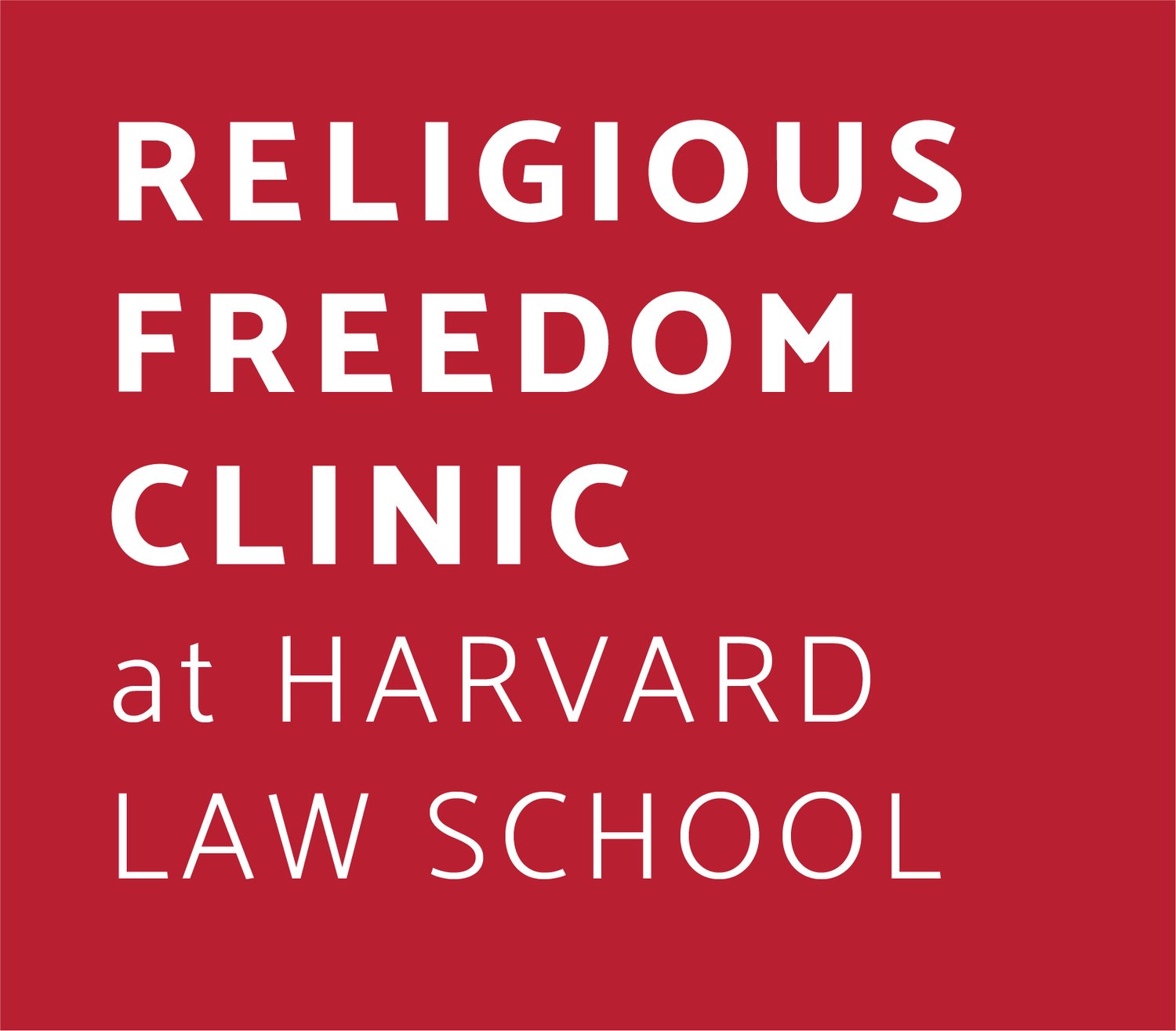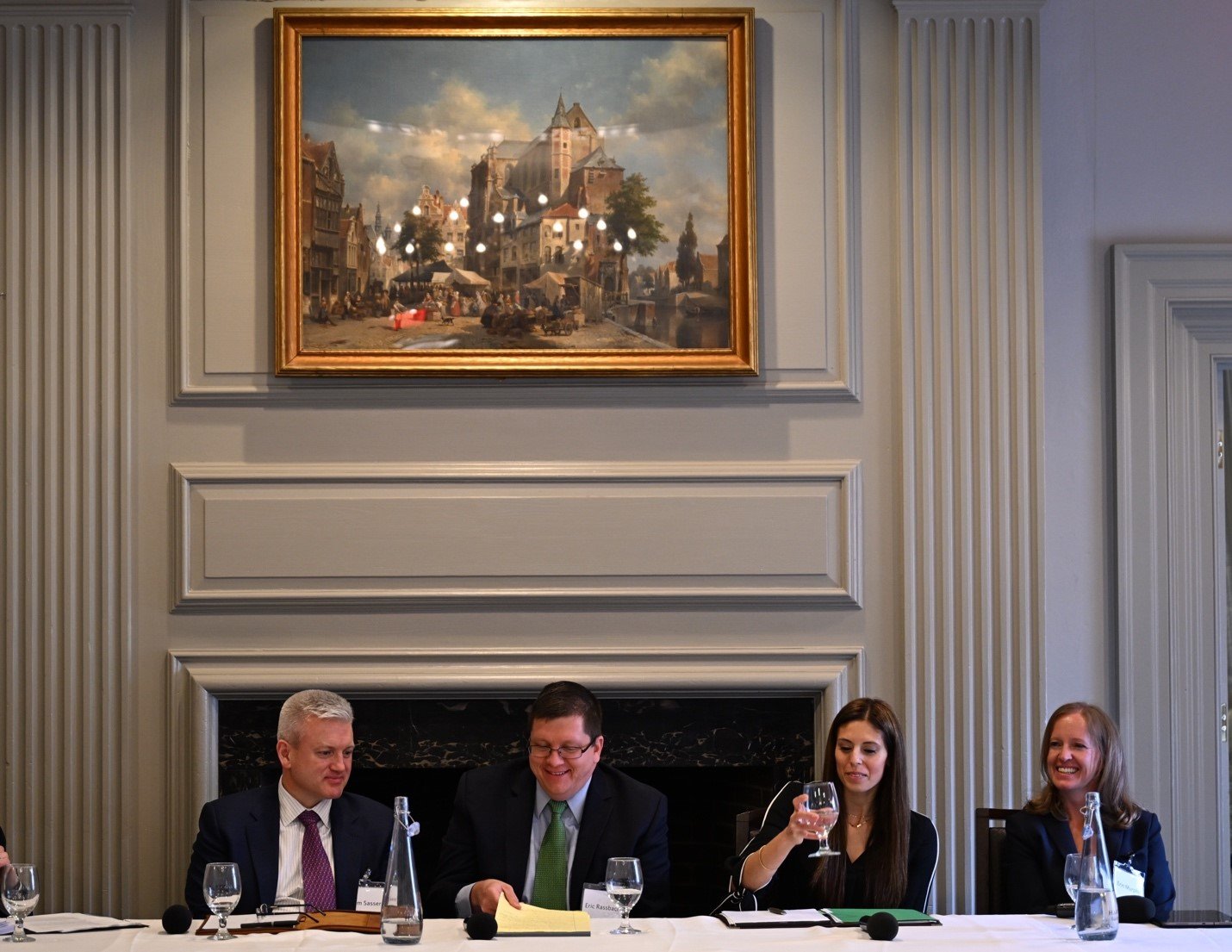Religious Freedom Symposium
Harvard Faculty Club, Cambridge, Massachusetts | April 11, 2024
The Religious Freedom Clinic at Harvard Law School held a symposium at the Harvard Faculty Club. The event included remarks from Clinic Director Professor Josh McDaniel and Harvard Law School Dean John C.P. Goldberg, along with panels addressing key topics such as the frontlines of religious freedom, the future of free exercise law, and perspectives on bridge-building and religious minorities.
Panel I —Frontlines of Religious Freedom
The Symposium began with a panel of all-star religious freedom litigators, who discussed recent developments in the law of religious exercise, moderated by Clinic Director Josh McDaniel.
Hiram Sasser, Executive General Counsel of First Liberty Institute, focused on Groff v. DeJoy, in which the Supreme Court cemented robust protections for religious employees under Title VII of the Civil Rights Act. “For the very first time in almost my lifetime, the law of the land is that your employer has to provide a religious accommodation that resolves the conflict that you have with your work requirement unless doing so is an ‘undue hardship,’ and by that they mean ‘significant burden or expense.’”
Eric Rassbach, Vice President and Senior Counsel at the Becket Fund for Religious Liberty, shifted gears to discuss an ongoing case at the Ninth Circuit, Apache Stronghold v. United States. “Apache Stronghold is a case that presents some crucial questions for the religious liberty field. Does RFRA apply to all religions equally? Does RFRA apply when business interests are at stake on the other side of the case? And does RFRA apply to the use of federal lands? And the doctrinal question that’s lurking beneath all that is: What is a substantial burden on religious exercise?”
Amrith Kaur Aakre, District Director at the Equal Employment Opportunity Commission, walked through the litigation process and decision in Singh v. Berger, a religious accommodation case she spearheaded while director of the Sikh Coalition. In that case, the D.C. Circuit vindicated the right of Sikh men to maintain their beards and other articles of their faith while going through Marine Corps boot camp. Aakre described the courtroom at oral argument in the case as filled “with observant Sikhs who were in the Army or other military roles. It was regal. They’re wearing their turbans and their beards, [and] they’re wearing their uniforms. You could feel the electricity in the air.”
Erin Murphy, Partner at Clement & Murphy PLLC, shared insights on Kennedy v. Bremerton School District, a recent Supreme Court case that handed down multiple landmark First Amendment holdings grappling with the Free Speech, Free Exercise, and Establishment Clauses. She highlighted the Court’s holding that “the notion that you have to squelch the religious exercise and free speech of a government employee just because someone might mistakenly feel that if they don’t join in there would be a problem . . . — that is not the kind of coercion that the Establishment Clause is concerned with.”
remarks by dean goldberG
Harvard Law School Dean John C.P. Goldberg joined the conference to offer his welcome.
“Congratulations to Professor McDaniel and the Clinic for both this conference and for what it does every day.”
“The Religious Freedom Clinic,” Dean Goldberg said “stands as a testament to the power of working together to protect our nation’s wide variety of beliefs, faith traditions, and devotional practices. In doing so it exemplifies the Law School’s commitment, not only to educate the next generation of lawyers and leaders, but also to cultivate both discourse and debate in service of advancing justice and the rule of law.”
Panel II — Future of Free Exercise
The second panel featured a discussion on the future of free exercise law, moderated by the Honorable John K. Bush.
Judge John K. Bush, Circuit Judge on the United States Court of Appeals for the Sixth Circuit, opened the discussion by noting the timeliness of the Clinic’s work in a rapidly changing Free Exercise landscape. “We come to Harvard expecting to learn how to be real lawyers,” observed Judge Bush, a 1989 graduate, “and the clinic helps students do precisely that.”
During their discussion, the panelists agreed that the Supreme Court has reinvigorated free exercise protections in the wake of its limiting decision, Employment Division v. Smith.
Nathan Chapman, Pope F. Brock Professor of Law, University of Georgia, warned of the importance of maintaining essential popular support for religious freedom and free exercise rights. “What matters for the long-term protection of religious liberties is national sentiment, the sense in the community that religious liberty is of fundamental importance” he said.
Mark L. Rienzi, President and CEO of the Becket Fund for Religious Liberty and Professor and Co-Director of the Center for Religious Liberty at Catholic University of America, observed that “over the last dozen years, the Court has done an excellent job of making Smith something more like a fall back,” signaling, he suspects, that the end of Smith’s rational basis rule is near. Rational basis, he argued, is “a terrible rule for protecting constitutional rights.” “We would never let any of our other constitutional rights be restricted whenever the government has a rational reason.”
Panel III —Bridgebuilding and religious minority perspectives
The afternoon panel discussed minority faith perspectives and religious freedom as a tool for bridgebuilding. Professor Jim Sonne, founding director of the Religious Liberty Clinic at Stanford Law School, moderated the conversation.
Jim Sonne, Professor of Law and Director of the Religious Liberty Clinic at Stanford Law School, reflected on his years as an educator, practitioner, and clinical director: “It’s the range of clients that we serve, the diversity of students we attract, and the wonderful allies with whom we work that stand out. How often does one get to serve, to teach, to strive side by side with those who may differ on some of life’s most important questions, yet suffer or join together for the right of individuals and communities to answer those questions for themselves? It’s a much-needed light of unity and fraternity in a darkened and fractured world.”
Jeremy Rosen, Partner at Horvitz & Levy and President of Stephen Wise Temple, expressed how personal experience in the world of religious freedom litigation has “helped me understand how important principles of religious freedom and autonomy are for the broader community. Today, our Constitution protects all of us in the vitally important daily exercise of our respective and diverse faiths.”
Dr. Jacqueline Rivers, Professor at Harvard University, Executive Director and Senior Fellow for Social Science and Policy of the Seymour Institute, noted the bridgebuilding work being done behind the scenes, challenging the religious freedom litigators to always work towards greater unity: “It’s not being seen that the ACLU is partnering with the Harvard Religious Freedom Clinic.” She further highlighted the positive potential of engaging Black churches in that work, arguing that “having Black churches really involved, not necessarily just in court cases but in the court of public opinion,” would do much to further the cause of religious freedom.
Rose Godinez, Legal Director at ACLU of Nebraska, expressed gratitude for the Harvard Religious Freedom Clinic’s participation in the Johnson v. Cody-Kilgore Unified School District case representing a Lakota family whose children’s hair was forcibly cut by school officials. She highlighted the “law students’ cultural competency, and even cultural humility,” and identified the growing unity resulting from religious freedom litigation. She added, “Every single student was a pleasure to work with—they provided client counseling in a caring and respectful way, they centered our clients’ indigeneity and their beliefs. I could tell that they had done their research on Lakota beliefs and tried to make sure that our clients were as comfortable as possible and led in a good way.”
Faiyaz Hussain, Senior Advisor for the Muslim Public Affairs Council, encouraged that we “hold on to our principles,” viewing religious freedom litigation a “privilege... despite some of our losses... because we need to keep moving forward.” He provided a hopeful and resilient perspective on religious freedom litigation, encouraged that unity is always worthy to work towards.
















